情绪动词、关系代名词、形容词句子
- 格式:ppt
- 大小:95.00 KB
- 文档页数:27
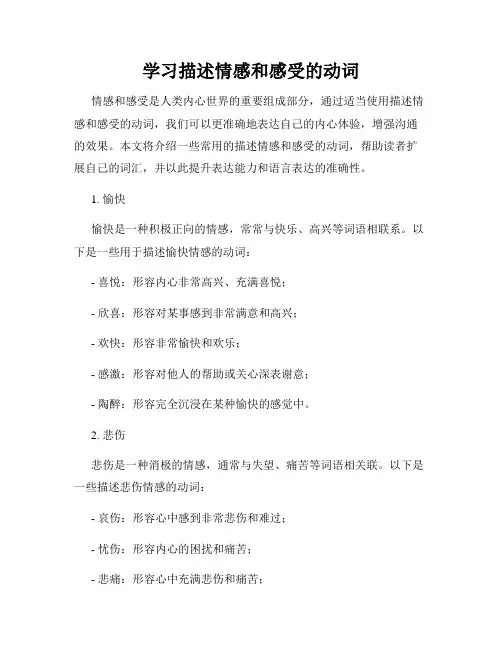
学习描述情感和感受的动词情感和感受是人类内心世界的重要组成部分,通过适当使用描述情感和感受的动词,我们可以更准确地表达自己的内心体验,增强沟通的效果。
本文将介绍一些常用的描述情感和感受的动词,帮助读者扩展自己的词汇,并以此提升表达能力和语言表达的准确性。
1. 愉快愉快是一种积极正向的情感,常常与快乐、高兴等词语相联系。
以下是一些用于描述愉快情感的动词:- 喜悦:形容内心非常高兴、充满喜悦;- 欣喜:形容对某事感到非常满意和高兴;- 欢快:形容非常愉快和欢乐;- 感激:形容对他人的帮助或关心深表谢意;- 陶醉:形容完全沉浸在某种愉快的感觉中。
2. 悲伤悲伤是一种消极的情感,通常与失望、痛苦等词语相关联。
以下是一些描述悲伤情感的动词:- 哀伤:形容心中感到非常悲伤和难过;- 忧伤:形容内心的困扰和痛苦;- 悲痛:形容心中充满悲伤和痛苦;- 倾诉:形容倾听他人的忧伤和痛苦,并给予安慰和支持;- 哭泣:形容因悲伤而流泪。
3. 兴奋兴奋是一种强烈且充满活力的情感,通常与激动、热情等词汇相关。
以下是一些描述兴奋情感的动词:- 热衷:形容对某事非常热情和投入;- 激动:形容内心感到非常兴奋和激动;- 期待:形容对未来的某件事情非常兴奋和期待;- 窥探:形容对某种新奇事物的探索充满好奇和兴奋;- 狂喜:形容情绪的高涨和充满喜悦。
4. 害怕害怕是一种消极情感,通常与恐惧、紧张等词汇有关。
以下是一些描述害怕情感的动词:- 恐惧:形容内心感到非常害怕和恐惧;- 焦虑:形容内心感到非常担忧和不安;- 惊恐:形容突然被吓到而感到非常害怕;- 紧张:形容内心感到紧绷和不安;- 战栗:形容因极度害怕而发抖。
5. 高兴高兴是一种积极的情感,常常与幸福、满足等词汇相联系。
以下是一些描述高兴情感的动词:- 快乐:形容内心感到非常愉悦和幸福;- 满足:形容对当前状况感到非常满意和幸福;- 愉悦:形容内心感到非常愉快和满意;- 喜悦:形容内心非常高兴和快乐;- 兴高采烈:形容内心感到非常兴奋和高兴。
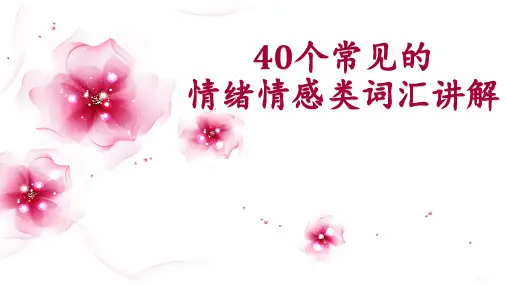

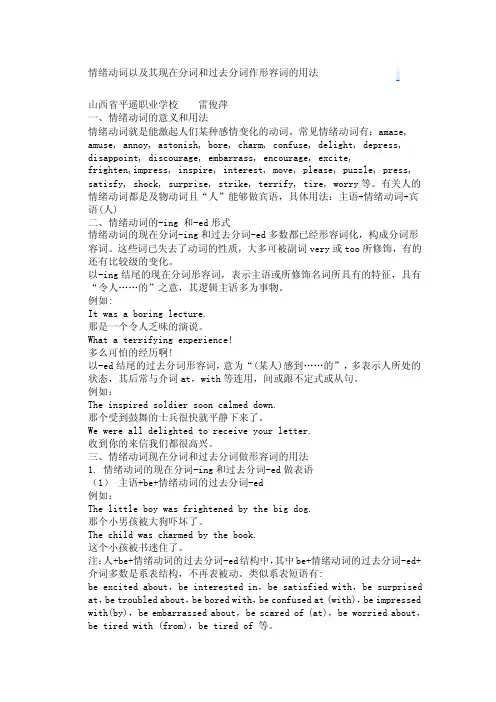
情绪动词以及其现在分词和过去分词作形容词的用法山西省平遥职业学校雷俊萍一、情绪动词的意义和用法情绪动词就是能激起人们某种感情变化的动词。
常见情绪动词有:amaze, amuse, annoy, astonish, bore, charm, confuse, delight, depress, disappoint, discourage, embarrass, encourage, excite,frighten,impress, inspire, interest, move, please, puzzle, press, satisfy, shock, surprise, strike, terrify, tire, worry等。
有关人的情绪动词都是及物动词且“人”能够做宾语,具体用法:主语+情绪动词+宾语(人)二、情绪动词的-ing 和-ed形式情绪动词的现在分词-ing和过去分词-ed多数都已经形容词化,构成分词形容词。
这些词已失去了动词的性质,大多可被副词very或too所修饰,有的还有比较级的变化。
以-ing结尾的现在分词形容词,表示主语或所修饰名词所具有的特征,具有“令人……的”之意,其逻辑主语多为事物。
例如:It was a boring lecture.那是一个令人乏味的演说。
What a terrifying experience!多么可怕的经历啊!以-ed结尾的过去分词形容词,意为“(某人)感到……的”,多表示人所处的状态,其后常与介词at,with等连用,间或跟不定式或从句。
例如:The inspired soldier soon calmed down.那个受到鼓舞的士兵很快就平静下来了。
We were all delighted to receive your letter.收到你的来信我们都很高兴。
三、情绪动词现在分词和过去分词做形容词的用法1. 情绪动词的现在分词-ing和过去分词-ed做表语(1)主语+be+情绪动词的过去分词-ed例如:The little boy was frightened by the big dog.那个小男孩被大狗吓坏了。
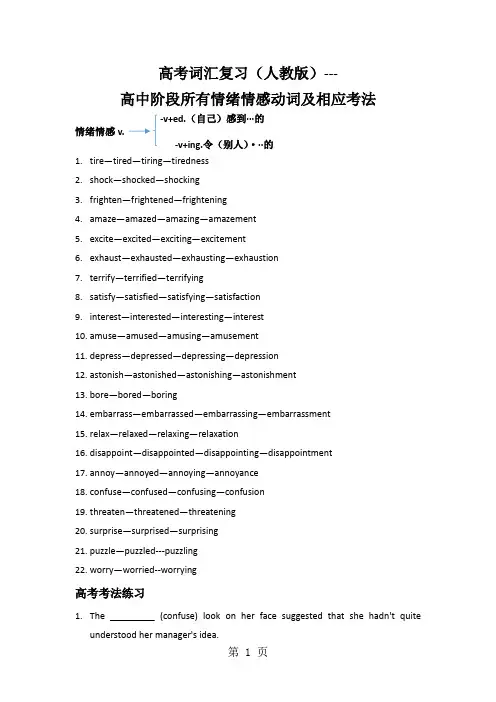
高考词汇复习(人教版)---高中阶段所有情绪情感动词及相应考法-v+ed.(自己)感到···的情绪情感v.-v+ing.令(别人)···的1.tire—tired—tiring—tiredness2.shock—shocked—shocking3.frighten—frightened—frightening4.amaze—amazed—amazing—amazement5.excite—excited—exciting—excitement6.exhaust—exhausted—exhausting—exhaustion7.terrify—terrified—terrifying8.satisfy—satisfied—satisfying—satisfaction9.interest—interested—interesting—interest10.amuse—amused—amusing—amusement11.depress—depressed—depressing—depression12.astonish—astonished—astonishing—astonishment13.bore—bored—boring14.embarrass—embarrassed—embarrassing—embarrassment15.relax—relaxed—relaxing—relaxation16.disappoint—disappointed—disappointing—disappointment17.annoy—annoyed—annoying—annoyance18.confuse—confused—confusing—confusion19.threaten—threatened—threatening20.surprise—surprised—surprising21.puzzle—puzzled---puzzling22.worry—worried--worrying高考考法练习1.The _________ (confuse) look on her face suggested that she hadn't quiteunderstood her manager's idea.2.They asked me so many ___ (confuse) questions that I got _______(confuse) at last.3.The children were ___ (tire)after the trip.4.The ___ (tire)trip lasted a whole day.5.The trip made the children ___ (tire).6.The bad weather made the trip ___ (tire).7.Tom’s parents are ___ (tire)at his ___ (tire)results of theexams.8.___ (disappoint)and angry, he left the meeting-room.9.It is ___ (disappoint)that he didn’t pass the examination.10.When hearing the ___ (surprise)news that Michael Jackson passedaway, they were to look at each other.11.He was ___ (worry)about his ___ (worry)son.答案:1.confused2.confusing, confused3.tired4.tiring5.tired6.tiring7.tired, tiring8.disappointed9.disappointing10.surprising11.worried, worrying12.。
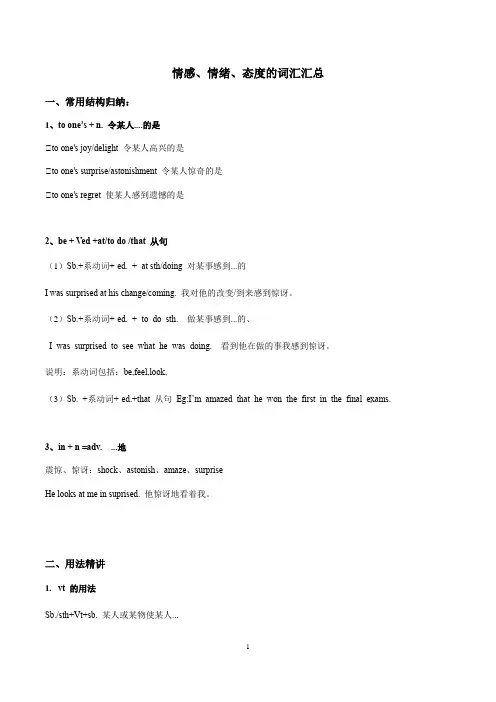
情感、情绪、态度的词汇汇总一、常用结构归纳:1、to one’s + n. 令某人....的是①to one's joy/delight 令某人高兴的是②to one's surprise/astonishment 令某人惊奇的是③to one's regret 使某人感到遗憾的是2、be + Ved +at/to do /that 从句(1)Sb.+系动词+-ed. + at sth/doing 对某事感到...的I was surprised at his change/coming. 我对他的改变/到来感到惊讶。
(2)Sb.+系动词+-ed. + to do sth. 做某事感到...的、I was surprised to see what he was doing. 看到他在做的事我感到惊讶。
说明:系动词包括:be,feel,look,(3)Sb. +系动词+-ed.+that 从句Eg:I’m amazed that he won the first in the final exams.3、in + n =adv. ...地震惊、惊讶:shock、astonish、amaze、surpriseHe looks at me in suprised. 他惊讶地看着我。
二、用法精讲1.vt 的用法Sb./sth+Vt+sb. 某人或某物使某人...eg: Mary moved us.玛丽使我们感动。
His words embarrassed me.他的话让我很尴尬。
2.vt.→adj.-ed 感到....的,修饰人,句子的主语通常是人(人的表情也用-ed)。
-ing 令人感到....的,修饰物,句子的主语通常是物。
amaze使惊讶→amazing令人惊讶的→amazed惊讶的;感到惊讶的annoy 使生气→annoying令人生气的→annoyed=angry生气的bore 使无聊→boring令人感到无聊的→bored感到无聊的confuse 使糊涂使困惑→confusing令人困惑的;费解的混乱的→confused感到困惑的/糊涂的convince 使确信;使信服→convincing令人信服的;有说服力的→convinced感到信服的disappoint 使失望→disappointing令人失望的→disappointed感到失望的discourage 使泄气;使沮丧→discouraging令人泄气的;灰心的;→discouraged感到泄气的disgust 使厌恶;使憎恶→disgusting令人厌恶的;令人作呕的→disgusted感到厌恶的/憎恶的embarrass 使尴尬→embarrassing令人尴尬的→embarrassed感到尴尬的excite 使兴奋→exciting令人感到兴奋的→excited 兴奋的;感到兴奋的exhaust 使精疲力竭→exhausting令人筋疲力尽的→exhausted感到筋疲力尽的fascinate 使着迷→fascinating令人着迷的→fascinated着迷的frighten 使惊恐使害怕→frightening令人惊恐的;令人害怕的→frightened感到受惊的/害怕的frustrate使灰心;使沮丧;使愤怒→frustrating挫败的,泄气的→frustrated感到挫败的,泄气的interest 使产生兴趣interesting →令人感兴趣的→interested对...感兴趣的move 使感动→moving令人感动的→moved感动的puzzle 使迷惑;使困惑→puzzling使为难的,费解的→puzzled感到迷惑的/困惑的relax 使放松→relaxing令人放松的→relaxed 放松的;感到放松的shock 使震惊→shocking令人震惊的→shocked感到震惊的surprise 使惊讶→surprising令人惊讶的→surprised惊讶的;感到惊讶的thrill 使狂喜;使激动;使极度兴奋→thrilling扣人心弦的;激动人心的→thrilled感到欣喜若狂/非常开心的tire 使疲劳→tiring令人疲劳的→tired感到疲劳的touch 使触动→touching令人触动的→touched触动的worry 使担忧→worrying令人担忧的→worried感到担忧的特殊变化:please→pleasing=pleasant→pleasedscare→scary→scaredsatisfy→satisfying=satisfactory→satisfieddelight使高兴;使愉快;使快乐delightful 令人高兴的delighted 高兴的愉快的(4)Sth makes/keeps sb +-ed. He often makes us interested in his classes.(5)和介词的搭配be surprised/amazed at 对...感到吃惊be embarrassed about/at 对...感到尴尬be excited/thrilled about/at 对....感到激动兴奋be shocked at 对..感到震惊be interested in 对...感兴趣be pleased/happy/satisfied with对....感到高兴满意be tired with/from由于....感到疲倦be exhausted from/with 因...筋疲力尽be fascinated with 对....着迷/动心be delighted with sb./sth 对...感到高兴be disgusted with 对...感到厌恶be annoyed=angry with 对...感到愤怒生气be scared/terrified/afraid/frightened of 对.....感到害怕/恐惧be tired of 对....感到厌倦be tired out/be exhausted 筋疲力尽be bored with 对....感到厌烦be moved/touched by 被...感动be moved/touched to tears 感动得流下了眼泪be deeply moved深深地感动了be relaxed about 对 ....感到放松be shocked by 被...震惊be shocked to do sth.震惊地做某事be worried about =worry about 担心... ,对...感到焦虑/担心be fascinated in/by 被...迷住be delighted for sb.为.。
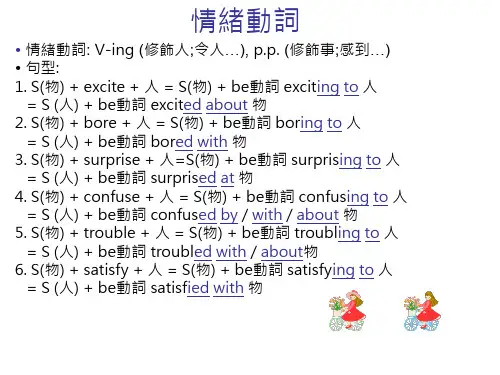
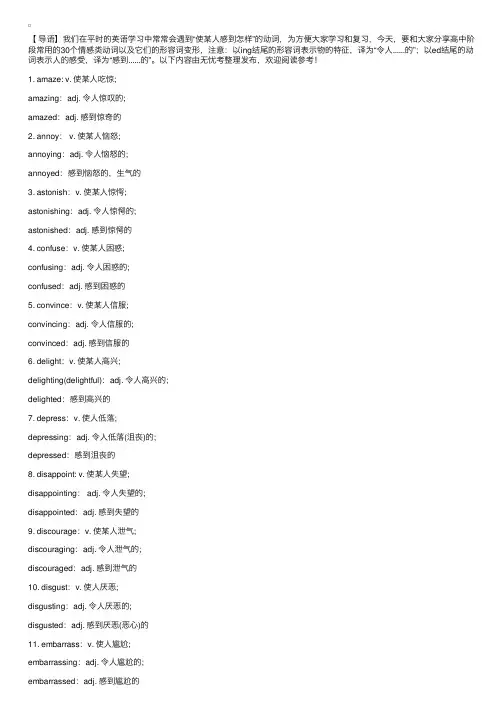
【导语】我们在平时的英语学习中常常会遇到“使某⼈感到怎样”的动词,为⽅便⼤家学习和复习,今天,要和⼤家分享⾼中阶段常⽤的30个情感类动词以及它们的形容词变形,注意:以ing结尾的形容词表⽰物的特征,译为“令⼈......的”;以ed结尾的动词表⽰⼈的感受,译为“感到......的”。
以下内容由⽆忧考整理发布,欢迎阅读参考!1. amaze: v. 使某⼈吃惊;amazing:adj. 令⼈惊叹的;amazed:adj. 感到惊奇的2. annoy: v. 使某⼈恼怒;annoying:adj. 令⼈恼怒的;annoyed:感到恼怒的,⽣⽓的3. astonish:v. 使某⼈惊愕;astonishing:adj. 令⼈惊愕的;astonished:adj. 感到惊愕的4. confuse:v. 使某⼈困惑;confusing:adj. 令⼈困惑的;confused:adj. 感到困惑的5. convince:v. 使某⼈信服;convincing:adj. 令⼈信服的;convinced:adj. 感到信服的6. delight:v. 使某⼈⾼兴;delighting(delightful):adj. 令⼈⾼兴的;delighted:感到⾼兴的7. depress:v. 使⼈低落;depressing:adj. 令⼈低落(沮丧)的;depressed:感到沮丧的8. disappoint: v. 使某⼈失望;disappointing: adj. 令⼈失望的;disappointed:adj. 感到失望的9. discourage:v. 使某⼈泄⽓;discouraging:adj. 令⼈泄⽓的;discouraged:adj. 感到泄⽓的10. disgust:v. 使⼈厌恶;disgusting:adj. 令⼈厌恶的;disgusted:adj. 感到厌恶(恶⼼)的11. embarrass:v. 使⼈尴尬;embarrassing:adj. 令⼈尴尬的;embarrassed:adj. 感到尴尬的12. encourage:v. 使有勇⽓; encouraging:adj. 令⼈⿎舞的; encouraged:adj. 感到⿎舞的13. excite:v. 使⼈兴奋;exciting:adj. 令⼈兴奋的;excited:adj. 感到兴奋的14. exhaust: v. 使⼈筋疲⼒尽; exhausting:adj. 令⼈筋疲⼒尽的; exhausted:adj. 感到筋疲⼒尽的15. fright:v. 使⼈惊恐;frightening:adj. 令⼈惊恐的; frightened:adj. 感到恐惧(害怕)的16. frustrate:v. 使⼈沮丧; frustrating:adj. 令⼈沮丧的; frustrated:adj. 感到沮丧的17. inspire:v. 使⼈⿎舞;inspiring:adj. 令⼈⿎舞的; inspired:adj. 感到⿎舞的18. interest:v. 使⼈有兴趣; interesting:adj. 令⼈感兴趣的; interested:adj. 感到有兴趣的19. irritate:v. 使⼈愤怒;irritating:adj. 令⼈愤怒的;irritated:adj. 感到愤怒的20. move:v. 使⼈感动;moving:adj. 令⼈感动的;moved:adj. 感动的21. please:v. 使⼈愉快;pleasing(pleasant):adj. 令⼈愉快的; pleased:adj. 感到快乐的22. puzzle:v. 使⼈困惑;puzzling:adj. 让⼈困惑的; puzzled:adj. 感到困惑的23. satisfy:v. 使⼈满意;satisfying(satisfactory):adj. 令⼈满意的;satisfied:adj. 感到满意的24. shock:v. 使⼈震惊; shocking:adj. 令⼈震惊的; shocked:adj. 感到震惊的24. sicken:v. 使⼈恶⼼; sickening:adj. 令⼈恶⼼的; sickened:adj. 感到恶⼼的26. surprise:v. 使⼈惊讶; surprising:adj. 令⼈惊讶的; surprised:adj. 感到惊讶的27. terrify:v. 使⼈害怕; terrifying:adj. 令⼈害怕的; terrified:adj. 感到害怕的28. tire:v. 使⼈疲倦; tiring:adj. 令⼈疲倦的; tired:adj. 感到疲倦的29. touch:v. 使⼈触动; touching:adj. 令⼈触动的; touched:adj. 感到触动的30. worry:v. 使⼈担忧; worrying:adj. 令⼈担忧的; worried:adj. 感到担忧的。
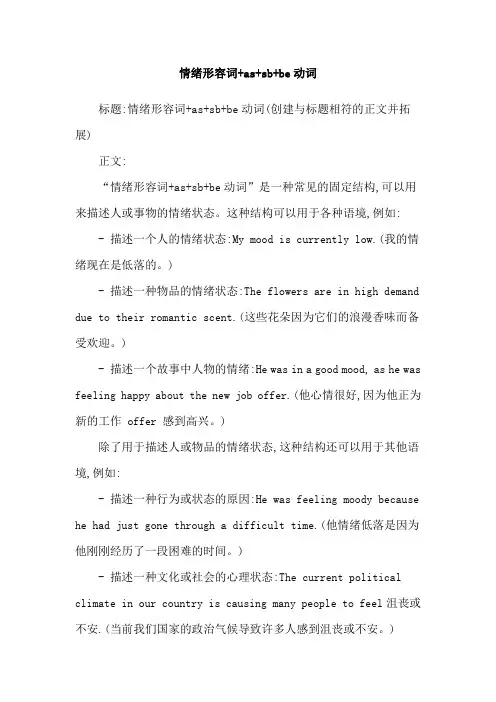
情绪形容词+as+sb+be动词标题:情绪形容词+as+sb+be动词(创建与标题相符的正文并拓展)正文:“情绪形容词+as+sb+be动词”是一种常见的固定结构,可以用来描述人或事物的情绪状态。
这种结构可以用于各种语境,例如:- 描述一个人的情绪状态:My mood is currently low.(我的情绪现在是低落的。
)- 描述一种物品的情绪状态:The flowers are in high demand due to their romantic scent.(这些花朵因为它们的浪漫香味而备受欢迎。
)- 描述一个故事中人物的情绪:He was in a good mood, as he was feeling happy about the new job offer.(他心情很好,因为他正为新的工作 offer 感到高兴。
)除了用于描述人或物品的情绪状态,这种结构还可以用于其他语境,例如:- 描述一种行为或状态的原因:He was feeling moody because he had just gone through a difficult time.(他情绪低落是因为他刚刚经历了一段困难的时间。
)- 描述一种文化或社会的心理状态:The current political climate in our country is causing many people to feel沮丧或不安.(当前我们国家的政治气候导致许多人感到沮丧或不安。
)拓展:除了使用“情绪形容词+as+sb+be动词”的固定结构,我们还可以使用其他方式来描述人或事物的情绪状态。
例如:- 使用形容词短语:I am feeling very tired today.(我今天感到非常疲劳。
)- 使用动词的过去式或完成式:He had always been a good student, but this year he was failing many of his assignments.(他一直是一个优秀的学生,但今年他许多作业都不及格。
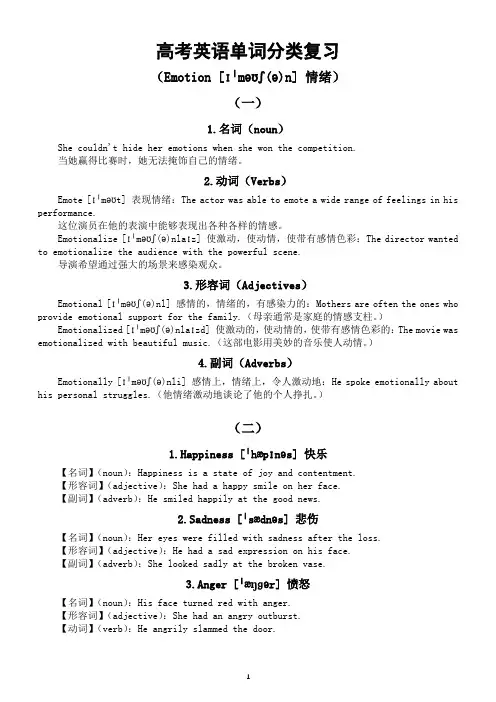
高考英语单词分类复习(Emotion [ɪˈməʊʃ(ə)n] 情绪)(一)1.名词(noun)She couldn't hide her emotions when she won the competition.当她赢得比赛时,她无法掩饰自己的情绪。
2.动词(Verbs)Emote [ɪˈməʊt] 表现情绪:The actor was able to emote a wide range of feelings in his performance.这位演员在他的表演中能够表现出各种各样的情感。
Emotionalize [ɪˈməʊʃ(ə)nlaɪz] 使激动,使动情,使带有感情色彩:The director wanted to emotionalize the audience with the powerful scene.导演希望通过强大的场景来感染观众。
3.形容词(Adjectives)Emotional [ɪˈməʊʃ(ə)nl] 感情的,情绪的,有感染力的:Mothers are often the ones who provide emotional support for the family.(母亲通常是家庭的情感支柱。
)Emotionalized [ɪˈməʊʃ(ə)nlaɪzd] 使激动的,使动情的,使带有感情色彩的:The movie was emotionalized with beautiful music.(这部电影用美妙的音乐使人动情。
)4.副词(Adverbs)Emotionally [ɪˈməʊʃ(ə)nli] 感情上,情绪上,令人激动地:He spoke emotionally about his personal struggles.(他情绪激动地谈论了他的个人挣扎。
)(二)1.Happiness [ˈhæpɪnəs] 快乐【名词】(noun):Happiness is a state of joy and contentment.【形容词】(adjective):She had a happy smile on her face.【副词】(adverb):He smiled happily at the good news.2.Sadness [ˈsædnəs] 悲伤【名词】(noun):Her eyes were filled with sadness after the loss.【形容词】(adjective):He had a sad expression on his face.【副词】(adverb):She looked sadly at the broken vase.3.Anger [ˈæŋɡər] 愤怒【名词】(noun):His face turned red with anger.【形容词】(adjective):She had an angry outburst.【动词】(verb):He angrily slammed the door.4.Love [lʌv] 爱【名词】(noun):Their love for each other was evident in their actions.【形容词】(adjective):She had a loving relationship with her partner.【动词】(verb):He loved her deeply.5.Fear [fɪər] 害怕【名词】(noun):He felt a wave of fear wash over him.【形容词】(adjective):She had a fearful look in her eyes.【动词】(verb):They feared the unknown.6.Surprise [səˈpraɪz] 惊讶【名词】(noun):She couldn't hide her surprise when she saw the gift.【形容词】(adjective):He had a surprised expression on his face.【动词】(verb):They surprised her with a birthday cake.7.Jealousy [ˈdʒɛləsi] 嫉妒【名词】(noun):Her jealousy was evident when she saw her ex with someone else. 【形容词】(adjective):He had a jealous reaction to his friend's success.【动词】(verb):She jealously guarded her possessions.8.Amusement [əˈmjuːzmənt] 娱乐【名词】(noun):The children watched the clown with amusement.【形容词】(adjective):He had an amused smile on his face.【动词】(verb):They amused themselves with games and jokes.9.Entertainment [ˌɛntərˈteɪnmənt] 娱乐【名词】(noun):The concert provided great entertainment for the audience.【形容词】(adjective):He had an entertaining performance.【动词】(verb):The magician entertained the crowd with his tricks.10.Fright [fraɪt] 惊吓【名词】(noun):She let out a scream of fright.【形容词】(adjective):He had a frightened look on his face.【动词】(verb):The sudden noise frightened the birds away.11.Relief [rɪˈliːf] 宽慰【名词】(noun):He felt a sense of relief when he found his lost keys.【形容词】(adjective):She had a relieved expression on her face.【动词】(verb):They were relieved to hear the good news.12.Excited [ɪkˈsaɪtɪd] 兴奋的【名词】(noun):Her excitement was palpable as she prepared for her trip.【形容词】(adjective):He had an excited look on his face.【副词】(adverb):She spoke excitedly about her upcoming event.13.Nervous [ˈnɜːrvəs] 紧张的【名词】(noun):His nervousness before the presentation was evident in his shaky hands.【形容词】(adjective):She had a nervous expression on her face.【副词】(adverb):He paced nervously back and forth.14.Depressed [dɪˈprest] 沮丧的【名词】(noun):His depression made it difficult for him to find joy in anything. 【形容词】(adjective):She had a depressed demeanor.【副词】(adverb):He spoke quietly and depressedly about his struggles.15.Content [kənˈtent] 满意的【名词】(noun):She felt a deep sense of contentment in her peaceful surroundings. 【形容词】(adjective):He had a content smile on his face.【副词】(adverb):They lived contentedly in their small cottage.16.Confused [kənˈfjuːzd] 困惑的【名词】(noun):His confusion was evident as he tried to solve the complex problem. 【形容词】(adjective):She had a confused expression on her face.【副词】(adverb):He looked around confusedly, unsure of where he was.17.Surprised [səˈpraɪzd] 惊讶的【名词】(noun):Her surprise was evident when she received the unexpected gift. 【形容词】(adjective):He had a surprised look on his face.【副词】(adverb):They reacted surprisedly to the sudden news.18.Worried [ˈwʌrid] 担心的【名词】(noun):His worry kept him up at night, unable to sleep.【形容词】(adjective):She had a worried expression on her face.【副词】(adverb):He paced worriedly, waiting for the test results.19.Envious [ˈɛnvɪəs] 羡慕的【名词】(noun):Her envy was apparent when she saw her friend's success.【形容词】(adjective):He had an envious reaction to his colleague's promotion. 【副词】(adverb):She looked at him enviously, wishing for the same opportunity.20.Amused [əˈmjuːzd] 开心的【名词】(noun):He couldn't help but burst into laughter, his amusement overwhelming. 【形容词】(adjective):She had an amused smile on her face.【副词】(adverb):They watched the comedy show amusedly, enjoying every moment.21.Entertained [ˌɛntərˈteɪnd] 娱乐的【名词】(noun):The entertainers provided great entertainment for the audience. 【形容词】(adjective):He had an entertained expression on his face.【副词】(adverb):She clapped and cheered entertainedly throughout the performance.22.Frightened [ˈfraɪtənd] 害怕的【名词】(noun):His frightened state was evident in his trembling hands.【形容词】(adjective):She had a frightened look on her face.【副词】(adverb):He ran frightenedly away from the loud noise.23.Relieved [rɪˈliːvd] 宽慰的【名词】(noun):She felt a wave of relief wash over her when she found her lost wallet.【形容词】(adjective):He had a relieved expression on his face.【副词】(adverb):They sighed relievedly, knowing that the danger had passed.24.Reluctantly [rɪˈlʌktəntli] 不情愿地【副词】(adverb):She agreed to go on the trip, but reluctantly.Reluctant [rɪˈlʌktənt] 不情愿的【形容词】(adjective):She was reluctant to share her personal experiences with others.Reluctance [rɪˈlʌktəns] n. 不情愿,勉强【名词】(noun):His reluctance to participate in the project was evident.25.Frighteningly [ˈfraɪtənɪŋli] 令人恐惧地【副词】(adverb):The thunder roared frighteningly, sending chills down their spines.Frightening [ˈfraɪtənɪŋ] 令人恐惧的【形容词】(adjective):The horror movie had a frightening effect on the audience.Fright [fraɪt] n. 惊吓,恐惧【名词】(noun):He couldn't move, paralyzed with fright.26.Amusingly [əˈmjuːzɪŋli] 有趣地【副词】(adverb):He recounted the funny incident amusingly, making everyone in the room laugh.Amusing [əˈmjuːzɪŋ] 有趣的【形容词】(adjective):The comedian delivered an amusing performance that kept the audience entertained.Amused [əˈmjuːzd] 开心的【形容词】(adjective):He had an amused smile on his face as he watched the funny video.Amusement [əˈmjuːzmənt] n. 娱乐,乐趣【名词】(noun):The amusement park was filled with laughter and excitement.Enviously [ˈɛnvɪəsli] 羡慕地【副词】(adverb):She looked at her friend's new car enviously, wishing she had one too.Envious [ˈɛnvɪəs] 羡慕的【形容词】(adjective):She had an envious expression on her face as she watched others receive awards.Envy [ˈɛnvɪ] n. 羡慕,嫉妒【名词】(noun):His success brought out feelings of envy among his peers.Envy [ˈɛnvɪ] v. 羡慕,嫉妒【动词】(verb):She envied her friend's talent and wished she could sing as well.27.Joyfully [ˈdʒɔɪfəli] 快乐地【副词】(adverb):They danced joyfully at the celebration, filled with happiness and delight.Joyful [ˈdʒɔɪfəl] 快乐的She had a joyful expression on her face as she opened the birthday present.The children's laughter filled the room, creating a joyful atmosphere.Joy [dʒɔɪ] n. 快乐,喜悦The news of her success brought great joy to her family.He couldn't contain his joy when he received the good news.28.Fearfully [ˈfɪərfəli] 害怕地She looked fearfully over her shoulder, expecting something to jump out at her. Fearful [ˈfɪərfəl] 害怕的He had a fearful expression on his face as he approached the haunted house. Fear [fɪər] n. 害怕,恐惧She felt a surge of fear as she walked through the dark, deserted street.Fear [fɪər] v. 害怕,畏惧They feared the unknown and hesitated to take risks.。
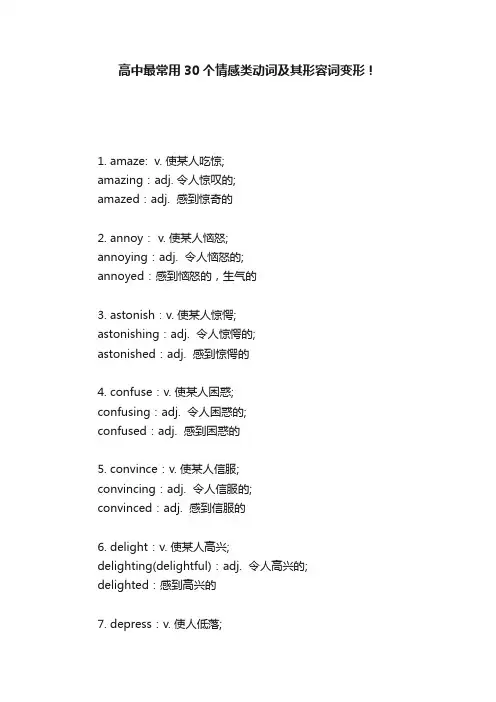
高中最常用30个情感类动词及其形容词变形!1. amaze: v. 使某人吃惊;amazing:adj. 令人惊叹的;amazed:adj. 感到惊奇的2. annoy: v. 使某人恼怒;annoying:adj. 令人恼怒的;annoyed:感到恼怒的,生气的3. astonish:v. 使某人惊愕;astonishing:adj. 令人惊愕的;astonished:adj. 感到惊愕的4. confuse:v. 使某人困惑;confusing:adj. 令人困惑的;confused:adj. 感到困惑的5. convince:v. 使某人信服;convincing:adj. 令人信服的;convinced:adj. 感到信服的6. delight:v. 使某人高兴;delighting(delightful):adj. 令人高兴的; delighted:感到高兴的7. depress:v. 使人低落;depressing:adj. 令人低落(沮丧)的; depressed:感到沮丧的8. disappoint: v. 使某人失望; disappointing: adj. 令人失望的; disappointed:adj. 感到失望的9. discourage:v. 使某人泄气; discouraging:adj. 令人泄气的; discouraged:adj. 感到泄气的10. disgust:v. 使人厌恶; disgusting:adj. 令人厌恶的; disgusted:adj. 感到厌恶(恶心)的11. embarrass:v. 使人尴尬; embarrassing:adj. 令人尴尬的; embarrassed:adj. 感到尴尬的12. encourage:v. 使有勇气; encouraging:adj. 令人鼓舞的; encouraged:adj. 感到鼓舞的13. excite:v. 使人兴奋; exciting:adj. 令人兴奋的; excited:adj. 感到兴奋的14. exhaust: v. 使人筋疲力尽; exhausting:adj. 令人筋疲力尽的; exhausted:adj. 感到筋疲力尽的15. fright:v. 使人惊恐; frightening:adj. 令人惊恐的; frightened:adj. 感到恐惧(害怕)的16. frustrate:v. 使人沮丧; frustrating:adj. 令人沮丧的; frustrated:adj. 感到沮丧的17. inspire:v. 使人鼓舞; inspiring:adj. 令人鼓舞的; inspired:adj. 感到鼓舞的18. interest:v. 使人有兴趣; interesting:adj. 令人感兴趣的; interested:adj. 感到有兴趣的19. irritate:v. 使人愤怒; irritating:adj. 令人愤怒的; irritated:adj. 感到愤怒的20. move:v. 使人感动;moving:adj. 令人感动的; moved:adj. 感动的21. please:v. 使人愉快;pleasing(pleasant):adj. 令人愉快的; pleased:adj. 感到快乐的22. puzzle:v. 使人困惑;puzzling:adj. 让人困惑的;puzzled:adj. 感到困惑的23. satisfy:v. 使人满意;satisfying(satisfactory):adj. 令人满意的; satisfied:adj. 感到满意的24. shock:v. 使人震惊;shocking:adj. 令人震惊的; shocked:adj. 感到震惊的24. sicken:v. 使人恶心;sickening:adj. 令人恶心的; sickened:adj. 感到恶心的26. surprise:v. 使人惊讶; surprising:adj. 令人惊讶的; surprised:adj. 感到惊讶的27. terrify:v. 使人害怕;terrifying:adj. 令人害怕的; terrified:adj. 感到害怕的28. tire:v. 使人疲倦;tiring:adj. 令人疲倦的;tired:adj. 感到疲倦的29. touch:v. 使人触动;touching:adj. 令人触动的; touched:adj. 感到触动的30. worry:v. 使人担忧; worrying:adj. 令人担忧的; worried:adj. 感到担忧的。
谈谈初中英语中表⽰情绪感觉的分词形容词知识讲解英语中表⽰情绪感觉的分词形容词⼀、表⽰情绪感觉的分词形容词由意为“使/让……”的及物动词加-ing或-ed构成。
学⽣应该明⽩去掉此类词的分词形式即-ing或-ed,得到的是及物动词。
这类及物动词有⼀个通⽤的句型:Sb./Sth.+Vt+Sb. 例如:What scares me most is that I'm going to fail in my English exam.最让我担⼼的是我会在英语考试中不及格。
It embarrassed him that he had no idea of what was going on.对所发⽣的事情⼀⽆所知,这让他很难堪。
⼆、表情绪感觉的V-ed分词形容词表⽰⼈⾃内⼼产⽣的⼀种感觉,故其所描述修饰的成分⼀般是有⽣命有思想的⽣物,主要是⼈,也包括有些动物。
往往译作“感到……的”,其通⽤的句型之⼀为:Sb + Link Verb(连系动词)+ V-ed {+prep.(介词) + Sb./Sth}. 例如:Roberta felt frustrated and angry. 罗伯塔既灰⼼⼜⽣⽓。
Her cat is interested in balls. 她的猫对球感兴趣。
三、表情绪感觉的V-ing分词形容词表⽰外界的⼈或事物造成的影响给⼈⼀种感觉,故此类形容词形容⼈或物均可(⽽很多的参考书上却武断地指出此类形容词⽤来形容物,这明显是不符合事实的,提醒⼤家注意)。
往往译作“令⼈……的”或“……⼈的”,其有⼀种常⽤的句式为:Sb./Sth. + Link Verb+ V-ing. 例如:Travelling is tiring. 旅⾏很累⼈。
That guy is very interesting. 那家伙很有趣。
四、绝⼤多数表⽰情绪感觉的分词形容词都有对称的V-ed和V-ing形式,但有少数词没有对应的V-ing形容词,表达此种意义时会⽤到另外⼀个词。
情感类动词及衍生词英语在英语学习中,情感类动词及其衍生词是表达个人情感和心理状态的重要词汇。
以下是一些常见的情感类动词及其衍生形式,以及它们在句子中的用法示例:1. Love (爱)- 衍生词: lover, lovely, loving- 例句: She loves her job, and it shows in her work.2. Hate (恨)- 衍生词: hatred, hateful, hater- 例句: He has a deep hatred for injustice.3. Like (喜欢)- 衍生词: likely, dislike, likeness- 例句: I like the new design, but I dislike the color.4. Dislike (不喜欢)- 衍生词: dislikable, disliked- 例句: She has a strong dislike for dishonesty.5. Adore (爱慕)- 衍生词: adoration, adored- 例句: The children adored their grandfather.6. Enjoy (享受)- 衍生词: enjoyable, enjoyment- 例句: He enjoys playing the guitar and finds it a greatsource of enjoyment.7. Prefer (更喜欢)- 衍生词: preference, preferred- 例句: I prefer working in the morning when it's quiet.8. Miss (思念)- 衍生词: missing, missive- 例句: She misses her family now that she's moved away.9. Regret (遗憾)- 衍生词: regretful, regrettable- 例句: He expressed his regret for not being able to attend the event.10. Forgive (原谅)- 衍生词: forgivable, forgiveness- 例句: It's important to forgive and forget in order to move on.11. Care (在乎)- 衍生词: careful, careless, carefree- 例句: She doesn't care about what others think of her.12. Worry (担心)- 衍生词: worried, worrywart- 例句: He's always worrying about the future.13. Desire (渴望)- 衍生词: desirable, desirous- 例句: She has a strong desire to travel the world.14. Fear (害怕)- 衍生词: fearful, fearless- 例句: He has a fear of heights.15. Surprise (惊讶)- 衍生词: surprising, unsurprised- 例句: The sudden announcement surprised everyone.这些情感类动词及其衍生词在日常生活中的使用非常广泛,能够帮助我们更准确地表达自己的情感和态度。
英语中的情感的名词和动词(共3页)-本页仅作为预览文档封面,使用时请删除本页-List 64: EmotionsNouns 名词affection 喜欢aggravation 激怒amusement 有趣anger 愤怒anguish 痛苦annoyance 生气,烦恼anxiety 忧虑awe 敬畏belligerence 交战bitterness 痛苦bliss 极度幸福boredom 厌倦bravery 勇敢cheer 鼓舞courage 勇气craziness 狂热dejection 沮丧delight 喜悦depression 郁闷disappointment 失望disgust 厌恶embarrassment enthusiasm 热情envy 妒忌fatigue 疲劳fear 惧怕feeling 感情fright 恐惧gladness 高兴glee 喜悦 happiness 幸福hope 希望horror 恐怖indifference 不关心jealousy 妒嫉joy 快乐joviality 快活laughter 大笑love 热爱mood 心情nervousness 紧张pain 痛苦passion 激情pity 同情pleasure 愉快prejudice 偏见pride 骄傲rage 暴怒regret 遗憾restlessness 不宁sadness 悲伤sorrow 悲哀tears 泪水temper 脾性terror 恐怖tiredness 疲倦trouble 烦恼weariness 疲劳zest 热心Verbs 动词abhor 厌恶aggravate 恶化agitate 鼓动amuse 娱乐anger 激怒antagonize 对抗bewilder 困惑blush 脸红bore 厌烦bother 打扰burn up 发怒clam 沉默,满足cheer up 鼓舞console 慰问cry 哭泣delight 快乐depress 抑压detest 痛恨disappoint 失望disgust 憎恶embarrass 困窘 excite 兴奋fatigue 疲劳fear 惧怕feel 感觉frighten 恐吓fume 冒火,生气gladden 使高兴hate 憎恨laugh 笑lament 悲伤like 喜欢mope 闷闷不乐mourn 哀悼please 取悦rejoice 喜悦sadden 悲伤shake up 激励stir 鼓动tire 感到疲倦tremble 发抖weep 哭泣Adjectives 形容词abhorrent 厌恶的abject 可鄙的affectionate 深情的afraid 害怕aggravated 恼火amorous 多情的amused 愉快的angry 愤怒的annoyed 生气的anxious 忧虑的apprehensive 担心,忧虑belligerent 交战的,敌对的berserk 狂暴,发疯bewildered 爱困惑的bitter 痛苦,苦涩的blissful 高兴bored 厌烦的bothered 着急的brave 勇敢calm 平静,冷静的cheerful 兴高采烈的cheery 愉快的crazy 发疯的dejected 沮丧的delighted 快乐的depressed 沮丧的disappointed 失望的disconsolate 忧郁disgusted 厌恶的embarrassed 困窘的enthusiastic 热情的envious 羡慕的excited 兴奋的 fatigued 疲劳的fearful 可怕的flustered 慌乱forlorn 被遗弃的,孤苦零丁的frightened 害怕的,受惊的glad 高兴gleeful 高兴grouchy 牢骚happy 快乐的insane 愚蠢irritated 恼火jealous 妒忌jolly 欢乐jovial 快活的loving 可爱的melancholy 忧郁merry 欢乐的moody 易怒的mournful 悲伤的nervous 紧张不安的painful 痛苦的passionate 热情的pleased 满意restless 烦躁不安的sad 忧愁的saddened 悲哀的shy 腼腆的sorrowful 悲伤的tearful 流泪的timid 胆怯的tired 疲劳的troubled 苦恼的upset 不安的weary 疲倦的Idioms and Expression 情感常用表达法at wit's end 黔驴技穷,计穷智尽blow one's top 发脾气fit to be tied 十分恼火go to pieces 精神崩溃happy as a clam 十分高兴,相当满足hot and bothered 慌张激动,气冲冲in a dither 紧张make a scene 发脾气,当众吵闹 (比较: make the scene 出现) method in one's madness 疯态中显出条理out of sorts 身体不好,精神不佳stand-offish 冷漠的不友好的tear jerker 感人泪下trouble the waters 陷入困境。
描写情绪的词语句子表示人情绪的词语有:高兴、开心、愉快、快乐、欢欣、欢喜、恼怒、气愤、生气、盛怒、负气、发怒、不悦、大怒、震怒、悲痛、悲伤、哀痛、哀伤、悲恸、伤心、悲哀、哀伤、沉痛、痛苦、难受、忧伤、难过、痛心、不快、忧愁、哀愁、忧闷、忧郁、忧虑、忧伤、惧怕、害怕、恐慌、惊恐、恐惧、胆寒扩展资料相关词汇1、高兴(gāo xìng):用来表达人的情绪,令人感到快乐的,愉快的,是内心的一种表达。
老舍《茶馆》第三幕:“天晚了,高兴住下,您就住下。
”2、愉快(yú kuài):欢欣快乐。
刘半农《敲冰》诗:“结着七十里路的坚冰,阻碍着我愉快的归路。
”3、生气(shēng qì):指发怒,因不合心意而不愉快。
巴金《利娜·第九封信》:“说起来也叫人生气,他一眼也不看我,他甚至把我推开一点。
”4、伤心(shāng xīn):心里非常痛苦,难过至极。
巴金《五十多个》:“ 孙二嫂坐在雪地上,埋下头摇着她怀里的死孩子,哭得很伤心。
”5、忧愁(yōu chóu):指因遭遇困难或不如意的事而苦闷。
冰心《繁星》:“真正的同情,在忧愁的时候,不在快乐的期间。
”参考资料来源:搜狗百科-高兴参考资料来源:搜狗百科-愉快参考资料来源:搜狗百科-生气参考资料来源:搜狗百科-伤心参考资料来源:搜狗百科-忧愁原发布者:dingjuanlfg高兴:欣慰、幸福、甜蜜、舒坦、舒畅、喜欢、开心、愉悦、感激、畅快、喜悦、兴奋、痛快、爽快、庆幸、惊喜愤怒:火冒三丈、怒火中烧、痛苦、痛恨、恐惧:寒心、心神不定、心有余悸、人心惶惶、惊魂未定、如坐针毡、惊心动魄、惊恐、胆怯、害怕、心慌、畏缩、惊吓悲哀:痛不欲生、苦涩、哀伤、心酸、忧愁、忧虑、悲痛、沉痛着急:坐立不安、心乱如麻、心急如焚、心事重重、心烦意乱、焦虑喜爱:入迷、心醉、倾慕、喜欢怨恨:仇恨、敌视、反感、可恶、可恨、痛恨、厌恶烦闷苦恼:别扭、不快、不爽、心烦、厌烦、烦闷、难受、窝囊、讨厌、憋闷、憋气忧愁:担心、发愁、愁闷、忧心忡忡抑郁:压抑、郁闷、郁郁寡欢自豪:得意、高傲、狂妄、优越感、体面、自大、自负、自得、委屈:抱屈、冤枉着急:急躁、焦急、心急、心切、焦躁羞愧:惭愧、丢脸、丢人、害羞、可耻、亏心、愧疚、腼腆、难堪、无地自容懊悔悔悟、后悔、抱歉、过意不去、内疚、歉疚、惊奇吃惊、好奇、惊讶、诧异警觉警惕疑惑怀疑、可疑、困惑、为难、迷惑、彷徨、无所适从同情感动、可怜、侧人之心、可惜、惋惜、心疼、怜悯满意宜人、惬意、顺心、随心、遂心、如愿敬佩心悦诚服、佩服、赞赏、赞美、赞叹、敬仰、尊敬、敬重感激感谢、没齿难忘思念怀念、牵挂、挂念、想念、渴慕、牵肠挂肚轻蔑轻视、蔑视、藐视、鄙视期望期待、向往、期求、殷切失望悲观、沮丧、无望、失意、挫败、心寒、惆怅、空洞、落魄、麻木、大失所望、自暴自弃描写心情的词语一、激动悲喜交集悲愤填膺百感交集感人肺腑动人心弦情不自禁心潮澎湃激昂慷慨慷慨激昂二、感激感激涕零感恩戴德谢天谢地没齿不忘感同身受三、懊丧垂头丧气灰心丧气心灰意冷心灰意懒万念俱灰自暴自弃黯然销魂大失所望四、悲痛、哀悼心如刀割切肤之痛哀毁骨立悲天悯人五、愤怒怒不可遏怒形于色怒火中烧忍无可忍六、欢喜欢天喜地欢欣鼓舞喜从天降大喜过望兴高采烈兴致勃勃乐不可支心花怒放手舞足蹈拍手称快皆大欢喜七、忧愁愁眉不展愁眉苦脸愁眉紧缩忧心忡忡忧心如焚心急如火郁郁寡欢八、烦乱坐立不安局促不安忐忑不安方寸大乱心烦意乱六神无主七上八下神魂颠倒心神不定心乱如麻若有所失惘然若失长吁短叹度日如年如坐针毡火烧火燎抓耳挠腮描写心情的四字词语:心旷神怡,怡然自得,兴高采烈,乐不思蜀,心花怒放欣喜若狂悲喜交集悲愤填膺百感交集感人肺腑动人心弦情不自禁心潮澎湃激昂慷慨慷慨激昂感激涕零感恩戴德谢天谢地没齿不忘感同身受垂头丧气灰心丧气心灰意冷心灰意懒万念俱灰自暴自弃黯然销魂大失所望心如刀割切肤之痛哀毁骨立悲天悯人描写表情的四字词语:大惊小怪大惊失色大惑不解从容不迫毛骨悚然大喜过望心平气和平心静气暴跳如雷心有余悸惊魂未定心安理得心如刀割心如死灰心驰神往心旷神怡心乱如麻心胆俱裂心神不定心神恍惚心悦诚服心惊肉跳心花怒放心慌意乱心烦意乱心惊胆战心猿意马心潮澎湃乐不可支乐以忘忧百感交集感慨万端欢天喜地欢欣鼓舞悲痛欲绝忧心如焚忧心忡忡闷闷不乐欣喜若狂怏怏不乐胆战心惊柔肠寸断悔恨交加惊喜交集喜不自胜喜出望外愤愤不平悲喜交集提心吊胆悲不自胜悲愤填膺痛不欲生痛心疾首痛快淋漓痛哭流涕义愤填膺胸有成竹得意洋洋目瞪口呆垂头丧气七上八下心急如焚心惊肉跳眉开眼笑心花怒放哀思如潮百念皆灰百感交集自鸣得意自惭形秽自愧不如惴惴不安战战兢兢怨气冲天欲得而甘心郁郁不乐忧心如捣忧心如焚忧心忡忡怏怏不乐心灰意懒心花怒放.心胆俱裂.心不在焉.喜逐颜开.喜不自胜.喜笑颜开.哀痛欲绝.高兴:愉快而兴奋。